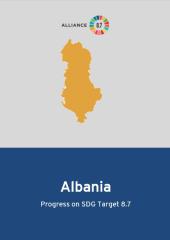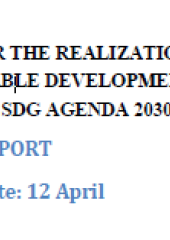Learn more about Albania
Priorities
- Prevent child labour, including children in street situation, through the development of a national study. Integrate child labour in local child protection strategies and plans. Strengthen the capacity of child protection structures. Raise awareness about child labour issues within the business community, particularly within the mining sector.
- Ensure protection and interventions according to the needs of children at risk of, or involved in, child labour. Map high risk areas to identify children, especially within the mining sector, and refer them to the correct services. Establish local mechanisms for direct assistance, including emergency social services, for children and families at risk of, or involved in, child labour. Improve labour inspection through capacity building. Enhance bilateral and regional cooperation around child labour.
- Improve law enforcement against child labour. Ensure children’s rights are protected by law enforcement structures through amendments to the Criminal Code and capacity building for police officers, prosecutors, and judges. Improve inter-institutional cooperation and exchange of information around the prosecution of child labour offenses.
- Decrease social and cultural factors that promote child labour. Inform children, parents, and the public about different forms of child labour, related risks, and assistance options. Include these topics in school and teacher training curricula.
- Enhance investigation and prosecution. Guide relevant structures to strictly enforce national legislation against trafficking in persons. Legislation should be improved and relevant structures should be trained to enable the ban of all forms of trafficking.
- Ensure that victims are protected and assisted. Mobilize identification mechanisms and resources. Strengthen partnerships between the parties responsible for identification and increase resources of the service structures.
- Raise awareness about trafficking prevention. Efforts should highlight national and international legislation on all forms of trafficking of persons, forced labour for children and adults, child begging, and children in street situation.
- Improve the coordination of anti-trafficking actions. Take appropriate steps against trafficking, complemented by civil society mechanisms. Strengthen the Office of the National Anti-Trafficking Coordinator.
Progress
- Establishment of Structures for Child Protection: Established 20 field teams for the identification and referral of economically exploited children.
- Managed cases and supported children exploited for work and begging, with 229 cases reported in 2022 and the involvement of Child Protection Units.
- Held meetings in various municipalities to discuss and encourage cooperation in managing cases of vulnerable children, involving the Child Protection Units and local actors from the Intersectoral Technical Group.
- Conducted awareness and sensitization activities against child labour and exploitation in collaboration with the State Agency for Child Protection Rights and the Child Protection Unit.
- Organized meetings and activities on the International Day of Street Children to raise awareness, provide information, and promote the protection and reporting of cases involving street children.
International Instruments
| Área | Ilo Instrument | Estado | Ratification date | CEACR comments |
|---|---|---|---|---|
| Child Labour | C138 Ratification of C138 - Minimum Age Convention (1973) |
In Force | 16 Feb 1998 | |
| Child Labour, Forced Labour, Human Trafficking, Modern Slavery | C182 Worst Forms of Child Labour Convention (1999) |
In Force | 02 Aug 2001 | |
| Child Labour, Modern Slavery | C029 Forced Labour Convention (1930) |
In Force | 25 Jun 1957 | |
| Forced Labour, Human Trafficking, Modern Slavery | P029 Protocol of 2014 to the Forced Labour Convention (1930) |
|||
| Forced Labour, Modern Slavery | C105 Abolition of Forced Labour Convention (1957) |
In Force | 27 Feb 1997 | |
| Child Labour, Forced Labour, Human Trafficking, Modern Slavery | C143 Migrant Workers (Supplementary Provisions) Convention (1975) |
In Force | 12 Sep 2006 | |
| Child Labour, Forced Labour, Human Trafficking, Modern Slavery | C181 Private Employment Agencies Convention (1997) |
In Force | 30 Jun 1999 | |
| Freedom of Association | C087 Freedom of Association and Protection of the Right to Organise Convention (1948) |
In Force | 03 Jun 1957 | |
| Freedom of Association | C098 Right to Organise and Collective Bargaining Convention (1949) |
In Force | 03 Jun 1957 | |
| Discrimination | C100 Equal Remuneration Convention (1951) |
In Force | 03 Jun 1957 | |
| Discrimination | C111 Discrimination (Employment and Occupation) Convention (1958) |
In Force | 27 Feb 1997 | |
| Occupational Safety and Health | C155 Occupational Safety and Health Convention (1981) |
In Force | 09 Feb 2004 | |
| Occupational Safety and Health | C187 Promotional Framework for Occupational Safety and Health Convention (2006) |
In Force | 24 Apr 2014 |
| Área | UN Treaty | Signature date | Ratification date | Estado |
|---|---|---|---|---|
| Child Labour | IV-11 Convention on the Rights of the Child (1989) |
26 Jan 1990 | 27 Feb 1992 | |
| Child Labour | IV-11-c Optional Protocol to the Convention on the Rights of the Child on the sale of children, child prostitution and child pornography (2000) |
5 Feb 2008 a | Accession | |
| Forced Labour, Human Trafficking | PALERMO_PROTOCOL Protocol to Prevent, Suppress and Punish Trafficking in Persons, especially Women and Children, supplementing the United Nations Convention against Transnational Organized Crime (2000) |
12 Dec 2000 | 21 Aug 2002 | |
| Human Trafficking, Modern Slavery | XVIII-4 Ratification of the Supplementary Convention on the Abolition and of Slavery, the Slave Trade and Institutions and Practices Similar to Slavery (1956) |
6 Nov 1958 a | Accession |
Sources: ILO Normlex & UN Treaty Collection


